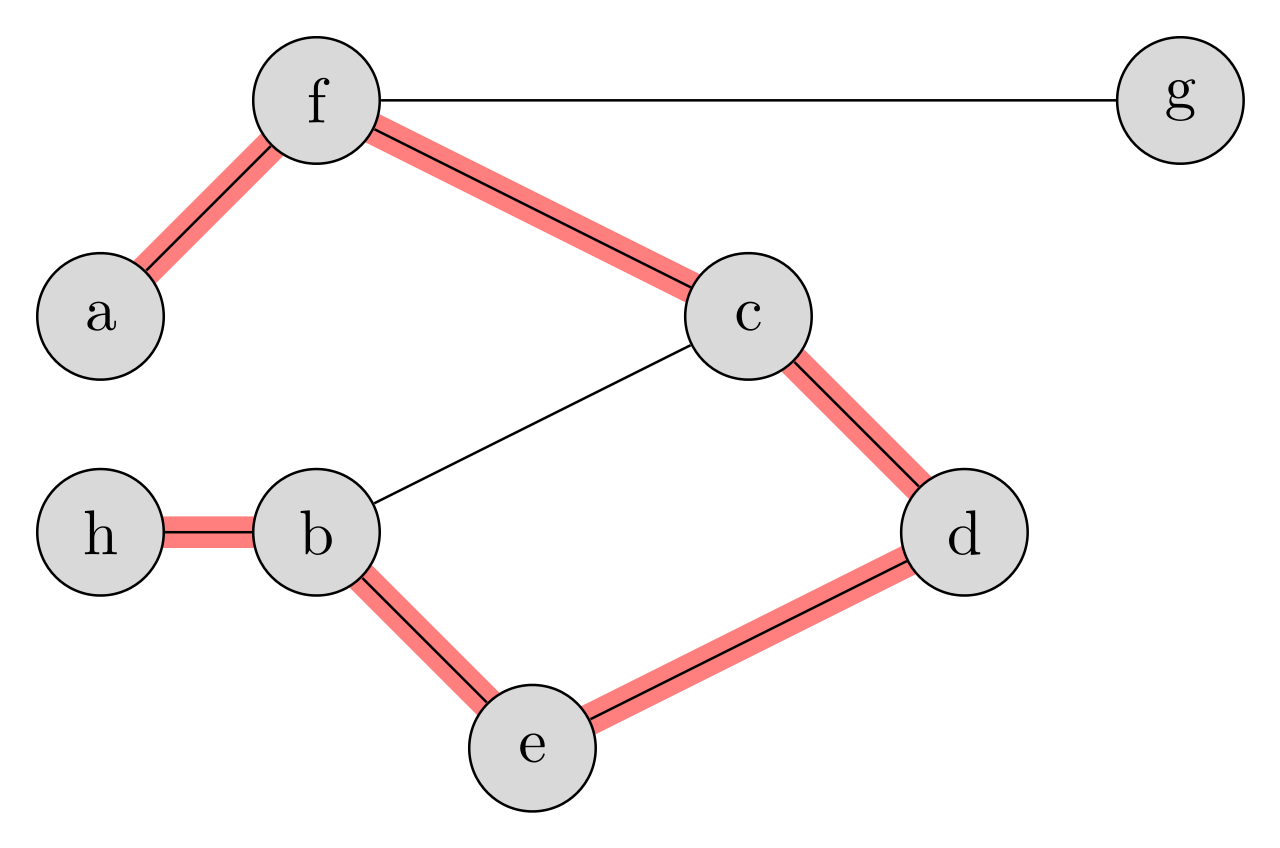A Graph is a non-linear data structure consisting of nodes and edges. The nodes are sometimes also referred to as vertices and the edges are lines or arcs that connect any two nodes in the graph. More formally a Graph can be defined as,
A Graph consists of a finite set of vertices(or nodes) and set of Edges which connect a pair of nodes.

Language : Java
References : GeeksForGeeks, Introduction to Programing CLRS
- BFS
- BFS COLORING
- DFS
- CONNECTED COMPONENTs DFS
- CYCLE DETECTION IN UNDIRECTED GRAPH DFS
- CYCLE DETECTION IN UNDIRECTED GRAPH BFS
- CYCLE DETECTION IN DIRECTED GRAPH
- TOPOLOGICAL SORT
- KAHN'S ALGORITHM FOR TOPOLOGICAL SORT
- KRUSKALS MST
- HAMILTONIAN PATH & CYCLE
- IS BIPARTITE GRAPH
let s<-Source node.
let G<-Graph
let Q<-queue
Q.enqueue s.
mark s as visited.
while Q is no empty
let currentVertex<-Q.dequeue.
for all neighbourVertex of currentVertex
if neighbourVertex is not visited
Q.enqueue neighbourVertex
mark neighbourVertex as visited
end of for loop.
end of while loop.BFS(s, G)
s <- source vertex
G <- Graph
let Q <- queue
let color[] <- 1 WHITE
Q.enqueue s
color of s <- 2 GREY
while Q is not Empty
let currentVertex = Q.dequeue.
color of currentVertex <- BLACK
for all neighbour of currentVertex
if color of neighbour is WHITE
set color of neighbour <- GREY
Q.enqueue neighbour
end of for
end of whileDFS(s , G)
s <- source vertex
G <- Graph
let S <- stack
S.push s
set s as visited.
while S is not Empty
let currentVertex <- S.pop()
for all neighbour of currentVertex
if neighbour is not visited
set neighbour to visited
S.push(neighbour)
end of for
end of while DFS(s , G , visited)
s <- source vertex
G <- Graph
visited <- boolean array
let S <- Stack
S.push(s)
set visited of s <- true
while S is not empty
let currentVertex <- S.pop()
for all neighbour of currentVertex
if neighbour is not visited
set visited of neighbour <- true
S.push(neighbour)
end of for
end of while
CC(s,G)
s <- source vertex
G <- Graph
let visited[] <- false (initially none vertex is visited.)
let count <- 0
for all vertex of G
if vetex is not visited
DFS(vertex ,G , visited)
incremrnt count
end of for
return count.hamiltonianPath(src,graph,visited,count,res)
src <- source vertex
graph <- Graph
visited <- boolean Array
count <- count of edges covered so far
res <- String containing coverted vertex to print
append src to res
set src to visited
if count is equal to |V-1| then print res and return 1
set visited(src) <- true
for all neighbour of graph(src)
if neighbour is not visited
set neighbour to visited
count += hamiltonianPath(neighbour,graph,visited,count+1,res)
end of for
return count[global variables]
WHITE = -1
RED = 0
GREEN = 1
isBipartite(s , G , colorMap)
s <- source vertex
G <- Graph
colorMap <- array contains color of each vertex
let Q <- Queue
use BFS put alternate color on earch level (RED/GREEN)
if a visited vertex comes again and have color which is not matching to the current level color
return false
Q.add(s)
let level <- 0
colorMap of s to GREEN
while Q is not Empty
let size <- size of Queue
while(size is greater then 0)
let currentVertex Q.dequeue()
for all neighbour of currentVertex
if neighbour color is WHITE
change color to level%2
else if neighbour color is not WHITE and it is not equal to level%2
return false;
end of for
increment level
end of while
end of while
return true
isBipartite(s,G)
let colorMap = array of color initially all color as WHITE
for all vertex of G
if color of vertex is WHITE
if isBipartite(vertex , G , colorMap) is false then return false
end of for
return true